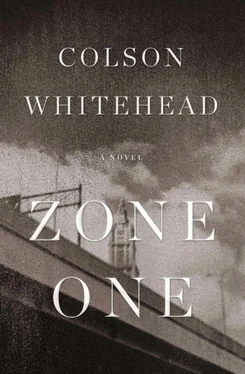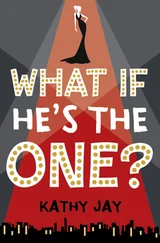The Lieutenant’s casual attitude was facilitated by the fact that the sweepers’ primary targets were stragglers. Compared to what the marines encountered in Manhattan during that initial, mammoth sweep, those assembled in the dumpling joint had it easy. Mark Spitz wouldn’t have signed up for the island had it been otherwise, New York homesickness or no.
“Buffalo, as ever, has great plans for you guys,” the Lieutenant said. He tossed the box of notebooks to the mule-eyed hulk slouching at the closest table, a man who went by the handle of the Professor, an appellation that contradicted his dumbfounded mien. He’d been a mate on a sport-fishing boat in sunnier times, steering rum-addled vacationers to schools of snapper via sonar. The Lieutenant motioned for him to pass the box around. “I know what you’re going to say—we need boots and they talk to us about numbers.”
Actually they had boots, and most of the sweepers had raided sneaker stores for more comfortable designer footwear after a round of death marches up high-rise stairwells; fortunately for them, the sneaker sponsor had manufactured several product lines for different ages, aesthetic appetites, and athletic inclinations. It was comforting, in the recesses of buildings, to see your buddy’s heel blink from the tiny red LEDs in a novelty running shoe, although Mark Spitz did not partake because of the obvious ankle-exposure issue. Boots was the Lieutenant’s catchall term for truly clutch materiel, the elusive, the vital. Mark Spitz heard the others shifting in boredom at the reference. What did boots symbolize for the man? Order. Sturdy rules. His trove of bygones. All survivors had them, the pet names and metonyms they used to refer to their pasts. Bagel, java, baseball cap, the object that was all objects, the furnishings of the good old days. Why couldn’t the Lieutenant maintain his shrine? Everyone else did.
Mark Spitz flipped through the pad. Faint pink-and-purple cacti sprouted in the margins. He recognized the sense of Buffalo’s plan. With the assembled data, their supply of eggheads could start projecting how many of the dead they’d find in your typical twenty-two-story corporate flagship, five-floor tenement, fifteen-story apartment complex, what have you. Every structure sheltered its likely trajectories and scenarios; they’d figured that out early. Take residential buildings, for example. Walk into one of the wizened tenements of downtown Manhattan and you could bet on finding at least one citizen who’d barricaded himself inside, turned, and then couldn’t get out. In the first wave, people got infected, barely making it home ahead of collapse. Then the plague wiped and reformatted their brains and they were trapped in their abodes, the most pathetic kind of city shut-in, their hands eventually groping their way toward expensive security locks but incapable of reaching them for the passel of splendid contemporary furniture they’d piled against it. Mark Spitz cursed his luck when he realized they were going to have to remove the door and get all that shit out of the way before they could put the skel down: the particle-board media centers laden with layaway plasmas, limited-issue replicas of Danish-modern wardrobes, the beloved go-to recliners grimed at the armrests from summers of sweat. These specimens were your average skels, not harmless stragglers but a reliable if small percentage of what you’d find in Zone One, so you had to stay frosty.
By now, Mark Spitz could look at a building and know what kind of weather was brewing inside. Office towers were the least populated. The nine-to-fivers had stopped coming to work when it went down, and most of the rabid skels were lured out by the marines, which left stragglers. (Perhaps, he thought, there will be a study of the farthest a straggler had traveled to its haunting grounds—across streams! quicksand! perilous canyons!—but that was far in the future.) A building like 135 Duane, with its panoply of enterprises, had its idiosyncrasies but nonetheless conformed to the prevailing narrative. Department stores, multinational coffee chains, half-constructed condos. Churches and banh mi shops. Although every address, every new chunk of the grid assigned to them, contributed its special embroideries, the story never changed.
2.4 stragglers per floor in this type of structure and .05 there. Numbers permitted Buffalo to extrapolate the whole city from Zone One, speculate about how long it will take X amount of three-man sweeper units to clear the island zone by zone, north to south and river to river. Then on to other cities. There was no other entity like New York City, but the silent downtowns bided across the country with their micropopulations, acolytes of the principles of the grid. The truths of the grid’s rectilinear logic, its consequences, of how people moved and lived inside boundaries, had already been applied to cities across the country through the decades, anywhere human activity and desire needed to be tamed and made compliant. Gangs of high-rises in Southwest municipalities flush with internet money, sterile pedestrian malls in Midwest cities of a certain size, run-down waterfront districts of fabricated historical import that had been tarted up into tourist mills. Sure, there was the problem of scale, but Manhattan was the biggest version of everywhere.
The city bragged of an endless unraveling, a grid without limit; of course it was bound and stymied by rivers, curtailed by geographical circumstance. It could be subdued and understood. Soon sweeper teams would roam the rural areas on an identical mission to that of the metro sweepers, concocting the equations of the countryside, putting numbers to nascent theories about skel dispersal patterns, and in time these numbers would deliver end dates and progress and the return to life before. As he sat in the restaurant, Mark Spitz pictured the Lieutenant’s box of tiny notebooks, overflowing with half-legible sweeper scribbling, being off-loaded from a military helicopter upstate and rushed by a harried private into an underground chamber at Buffalo HQ. Like it was someone’s liver being delicately transported to the waning recipient. He’d never been to Buffalo, and now it was the exalted foundry of the future. The Nile, the Cradle of Reconstruction. All the best and brightest (and, most important, still breathing) had been flown up to Buffalo, where they got the best grub, reveled in 24-7 generators and uncurtailed hot showers on command. In turn, they had to rewind catastrophe. Rumor was they had two of the last Nobel laureates working on things up there—useful ones, none of that Peace Prize or Literature stuff—chowing down on hearty brain-fortifying grub, scavenged fish oil and whatnot. If they could reboot Manhattan, why not the entire country? These were the contours of the new optimism.
After describing the kind of data that Buffalo expected of them and shooing questions of various pertinence (“No, Josh, we don’t need their weight unless it is something truly spectacular,” “Home addresses? What are you going to do, forward their mail?”), the Lieutenant shifted to his favorite pastime, the delivery of the Nightly News. He held that morning’s feed to the light. It was all positive, in line with the trend of late. To wit: “Organic-food fans will rejoice that Happy Acres claims this year will bring their biggest harvest yet—”
Grateful noises filled the dumpling house, for who among them could forget the return of fresh corn last year? Never in human history had so many delighted in removing a bit of kernel from between canines and bicuspids. Mark Spitz stumbled upon the Happy Acres crops his first night in camp. He’d ditched the mess hall for some air, dizzy from the laughter of the army guys and the other new recruits. It was in those dwindling days before the looting regs went into effect and scavenger crews had routed a den of bandits who had taken over one of the mega-drugstores. Half the bandits died in the gunfight and the other half eagerly took oaths of loyalty to the provisional government upon surrender. They returned with three trucks’ worth of medicine. Needless to say everyone took their cut, filling their utility vests and packs with booty, the favorite anti-tartar toothpaste and allergy tablets, travel size if possible. These products had kept them running in the old world, if only by placebo effect. The soldiers availed.
Читать дальше












